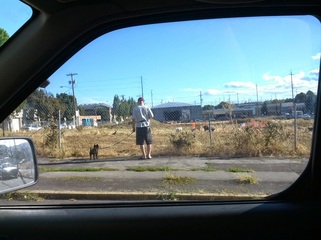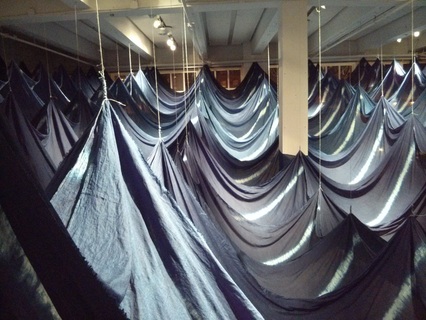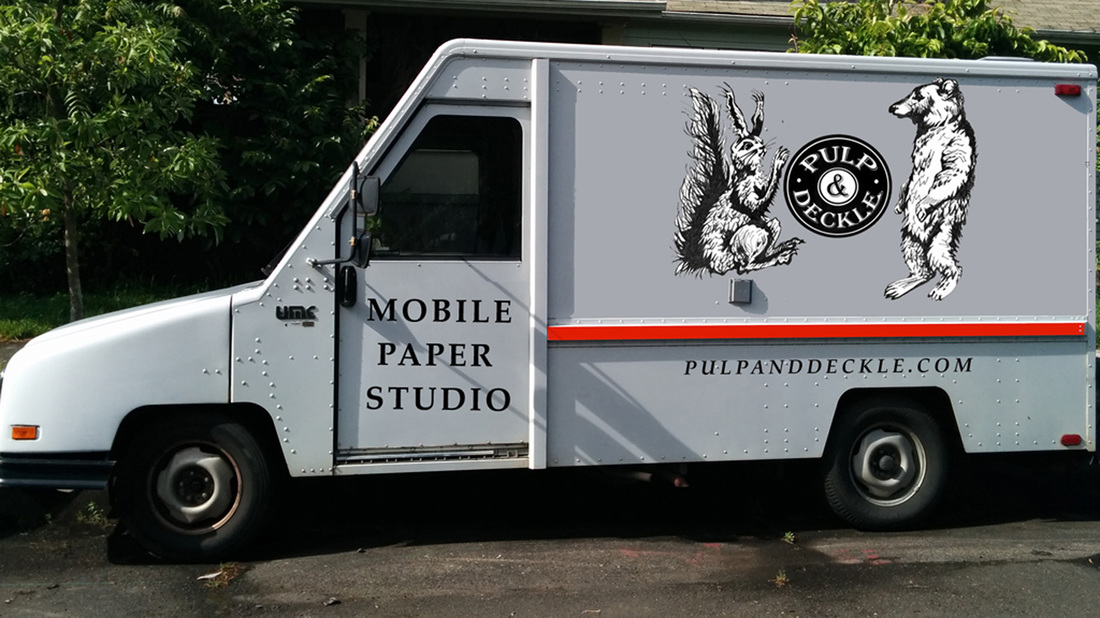|
Back in 2015 we made a Portland, OR themed coloring book printed on our handmade paper. We thought we'd revisit that project and share the illustrations Jenn made for the book here for you to use and enjoy! Feel free to download these images, print them out on your home printer, and have fun making them your own. All we ask is that you don't sell them, and that when sharing your coloring creations you credit Jenn Woodward from Pulp & Deckle as the artist. Thanks! Also, if you want to tip us you can make a donation to the studio at https://fundraising.fracturedatlas.org/pulp-deckle.
0 Comments
Yesterday we had our first go at making paper in our makeshift home studio. As many of you know last fall we moved from our home of 10 years in Portland, to a house in Oregon City. We had already been eyeing fixing up the space you see us working in as a home studio but never thought we'd need to be using it so soon.
A month ago we were busy with an open house, private workshops with teens and artists, prep for our spring workshop series, and plotting out production papermaking for a book project we are working on with c3:initiative. Everything seemed to be on track. Then things started to abruptly change. For those that are just getting to know us, we are a husband and wife team who operate a community hand papermaking studio. We began in fall 2012. Over the years we've been in 3 different studios, taught hundreds of students, worked with numerous artists, offered demos and sales at festivals and offsite locations, and rent our equipment and space for fellow makers to access. We had hoped that the studio would one day be our full time focus. After the first few years we realized that this would not be sustainable for many reasons. The past two years we have both had primary jobs outside of the studio that have brought us stability, personal growth and a steady income. This enabled us to focus on building the studio by doing things we wanted to do, rather than what we needed to do. Most of the time the studio is self sustaining, meaning that we bring in enough income to cover rent, materials, insurance, etc. We don't pay ourselves for the work we do at Pulp & Deckle. As the world has abruptly shifted, so have our lives. Gary was just laid off from his primary job, meaning our income has been reduced by half. It's a familiar story right now. We're grateful Jenn can work from home in her role as a Project Manager for the non-profit arts org c3:initiative. Without this income, and soon, unemployment for Gary, we would really be scrambling. Recently we realized that we were going to need to bring our studio home with us so we could continue making paper for the projects we have committed to. Oregon enacted a shelter in place order, and we are taking it very seriously. In the slideshow above you can see Gary making a cotton rag/abaca blend using denim fabric scraps and unbleached abaca fibers. Jenn is making iris paper from materials harvested in our yard. These papers will be part of an edition of books that c3:initiative received grant funding to make, commemorating the last five years of the papermaking residency program that we collaborate on together. We're making 360 pieces of paper for the project. The rainy conditions, allergies, and cold weather are making this a somewhat slow process, but we'll get there! Thank you to everyone who has signed up for workshops and has deferred their registration to future classes. We're hopeful we'll be back in our North Portland studio soon. Until then, if you can support our work we'd be forever grateful! Here are the ways you can do that.
Our commitment to process, hand making, and sharing the craft of paper is as strong as ever. Thank you for helping us keep going! It's a crazy and unpredictable moment in global history. Be kind to yourself and to others. There's no way to know what tomorrow might bring, but for today we can do what we need to to help ourselves and each other.  Where these goats once grazed is now a huge development called "The Goat Blocks." Where these goats once grazed is now a huge development called "The Goat Blocks." Over the past year or so we've seen snowballing change in Portland. The city is struggling with growing pains that have resulted in a housing crisis, the shuttering of iconic businesses, and the displacement of artists. Yesterday the IPRC (Independent Publishing Resource Center) announced the need to move as their rent was increased by 300%. They've launched a kickstarter campaign to raise funds for their move (we saw the announcement right as it went up and were proud to be the first backers.) This is the most recent in a growing trend of art spaces that are no longer affordable for their tenants. While we recognize the need for new construction to help ease real estate costs, we also see the need for alternative spaces to be available for creative use, such as the 7 acre eco-industrial park, Green Anchors. Doing a google search for "art spaces displacement artists Portland Oregon" it's easy to see that artists and art spaces are struggling. Here's a list of articles from the past several months;
And last year artist Carye Bye wrote a very personal account on why she could no longer stay in Portland that was published by Willamette Week. Looking at this, you might think we're feeling pessimistic about Portland's future. While it would be foolish to not be concerned, we are choosing to be optimistic. We love Portland. We choose this city, warts and all. No place is perfect, but there is so much that is good about Portland that we don't want to give up on living here. Our hope is that the new growth will shine a light on problems so that we as citizens can try to do something about them. If Portland wants to have a diverse (racially, culturally, and economically) populous we need to find ways to shape the future beyond the pull of market forces.  Rowland Ricketts: Work Time, The last exhibition on view at the Museum of Contemporary Craft Rowland Ricketts: Work Time, The last exhibition on view at the Museum of Contemporary Craft How can we do this? One way is to support the artists, orgs and small businesses that draw people to want to be here. If you don't patronize them, they will go away. Even large institutions that might seem like they could withstand tough times are not immune, as we saw with the recent closing of the Museum of Contemporary Craft. One of the major reasons cited for the closure was that the museum had been operating on a deficit for several years. While it can't be said for certain that increased attendance and donations would have saved the museum from closing, it certainly would have made it less likely. Another way is to help out when help is needed. If you can't give to a kickstarter or other fundraising effort, then share their message so it reaches people who can give. If you have more time than money consider volunteering. Go see art, dance and theater exhibitions, especially when it's free to do so. Many artists and orgs get RACC and other grants funding and high attendance reports will help ensure that the projects you want to see will get funded in the future. It may seem like the problems are too big for any of us to make a difference. That's why we have to come together. Resource sharing is something we've had the benefit of over the past several years, during our time in the c3:initiative creative business incubator. This is not a new way for artists and small businesses to survive, but it is an increasingly important one considering Portland's increasing real estate costs. A recent example of resource sharing is the XOXO Outpost, a pay-what-you-can shared workspace founded by graphic designer Andy McMillan and Andy Baio, who helped found Kickstarter. The more we can come together and pool our resources, the more we can accomplish. This brings me to our future in Portland. This fall our incubator term is ending. We've known that we would need to find a new space for the studio, and have been looking. And the conclusion was that in order for our business to grow and survive, we have to change our business model. So we are buying a food truck and turning it into a mobile paper studio. Rather than have all our money go towards paying rent on a physical space we are seeking out more partnerships with schools, businesses, artists, and creatives. The truck is small enough that we can park in most driveways, so we can pull up outside an artist's home and they could rent the studio from us for the day. Or we can drive out to a farm on Sauvie and teach a class using agricultural waste to make paper. Or we can set up in a parking lot outside a school and have a pop-up class. While the mobile model is not a good solution for everyone, it is a good solution for us. And it's becoming a more popular solution for other creative businesses and orgs too. The Portland Opera just unveiled their "Opera a la Cart" truck, a mobile performance venue that you can check out around town this summer. One of the inspirations for our mobile studio came from another notoriously expensive place for real estate, New York City. The ArtBuilt Mobile Studios are using the mobile studio as a platform for publicly engaged art making (something we strongly support!) We won't lie, we've had many a conversation circling around the idea of leaving Portland and setting up a studio on some acreage near the coast, or in the gorge. We've felt the squeeze of rising costs and increasing debt, like so many others. This is one of the primary reasons why we're crowdfunding for our mobile studio, rather than taking out a business loan. Adding to our student loans, mortgage and credit card debt, health care costs, etc. will make it even more difficult for our small business to survive. Beyond the practical financial concerns, we want to know that the community supports us and wants us to be here. Since starting our business in the fall of 2012 we've taught hundreds of students and founded an artist residency program, in addition to creating custom orders and retail goods. We've had a lot of positive feedback, and now we need our supporters to take action and help us evolve. Together we can help keep the ART in PoRTlAnd. Share and contribute to our kickstarter HERE. Thank you!!! |
The StudioPulp & Deckle is a handmade papermaking studio located in Oregon. Archives
September 2023
Categories
All
|
|||||||||||||||||||||||||||||||||||||||||||||||||||||||||||||||||||||||


 RSS Feed
RSS Feed